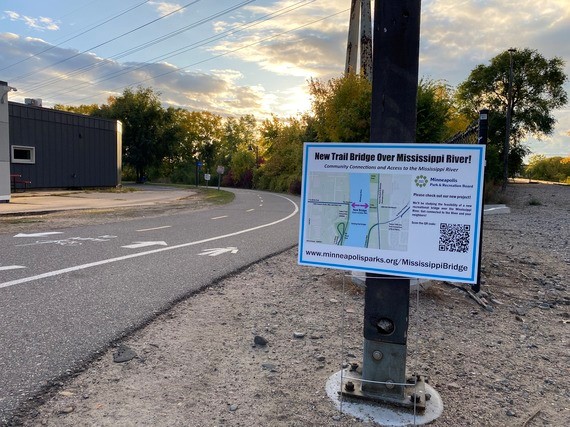
The Minneapolis Park and Recreation Board (MPRB) is studying a potential new bridge and gathering space for people walking, running, biking or rolling over the Mississippi River between North and Northeast Minneapolis.
The crossing will run parallel to the existing BNSF Railway Bridge and align with the Great Northern Greenway, which spans Minneapolis from Theodore Wirth Parkway to the Minneapolis Diagonal Trail.
On January 4 a new feasibility report was published that looks at several factors, including: neighborhood and site analyses; structural typologies of a new bridge; landscapes at either end of the new bridge; regulatory requirements; costs; and due diligence in exploring options for using the existing BNSF Railway Bridge.
This is the first step of an important project that connects communities to each other and the Mississippi River. The report notes the bridge project in North and Northeast Minneapolis is feasible, however there are several challenges to solve. View the report at minneapolisparks.org, Mississippi River Recreational Bridge Initial Engagement Summary.
Along with producing the report, the project team drafted an initial engagement summary of what has been heard so far from the community. The summary includes a set of working goals and was produced after meeting with several neighborhood organizations and local advocacy groups, conducting morning and evening commute intercept surveys, hosting an online survey, and having one-on-one conversations. The team will align the design effort with the working goals as the project progresses and more in-depth community engagement gets underway.
Upcoming community engagement events
Over the next several months the MPRB and the project team will be developing concepts for the bridge crossing and the connections on either end. The community’s input is essential to the success of the project and ensuring it reflects the neighborhoods to which it connects.
On January 29 and 30 the MPRB will host open houses at Broken Clock Brewing and Farview Recreation Center, both directly adjacent to the Great Northern Greenway corridor. Everyone is welcome at either or both locations. Though the content will be the same at either location, conversations will be focused around each community’s needs. Both spaces are kid-friendly and snacks and non-alcoholic refreshments will be provided.
Open Houses: January 29, 5 to 7 p.m., come any time. Broken Clock Brewing, 1712 Marshall St NE, Suite 100. And on January 30, 5 to 7 p.m., come any time. Farview Recreation Center, 621 N 29th Ave.
MPRB will also host site tours of the Overlook and 1720 Marshall St, the two likely landings for either end of the bridge.
Site Tours: The Overlook at 26th Ave N, (parking available on Pacific St, no parking on 26th Ave. N.) on February 3, 10 to 10:45 a.m., arrive at 10 a.m. And the other site tour at 1720 Marshall St NE, (parking available on adjacent streets) on February 3, 11 to 11:45 a.m., arrive at 11 a.m.
Report Conclusion: A new recreational bridge is required to realize the community-connecting bridge illustrated within the adopted plans of the MPRB, City of Minneapolis, and Hennepin County. Converting or otherwise reusing the existing 140-year-old BNSF Bridge, as previously assumed in those plans, results in a substandard user experience, costs significantly more if railway use continues, and ultimately takes years, potentially decades to negotiate and complete.
Creating a new bridge, arguably within the existing corridor of the BNSF Bridge, is a prudent and feasible option. It provides equitable connections to other communities, destinations, and natural resources, and creates a low-stress environment solely for human use, away from speeding vehicles, loud trucks, and noxious emissions. A new bridge puts North and Northeast Minneapolis communities on the river, rather than just overlooking it.
Next Phase: The next phase of work includes community engagement and developing concepts for a new bridge. The MPRB plans to host Open House events later this winter, stay tuned for details.
A target project cost, including all construction costs, studies, design and engineering, permitting and contingencies will be developed by the MPRB using the information provided within the feasibility report. Once a target project cost is established, the remaining phases of work, from concept design through construction documentation, will create a design that matches that cost.
Find more info at minneapolisparks.org/park-care-improvements/park-projects/current_projects/feasibility-study-and-concept-planning-for-non-vehicular-bridge-over-the-mississippi-river/.


